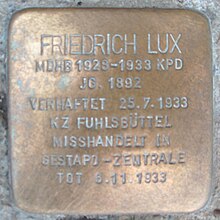Friedrich Lux (politician)
Friedrich ("Fiete") Lux (born September 28, 1892 in Imten , East Prussia ; † November 6, 1933 in Fuhlsbüttel concentration camp ) was a German politician ( KPD ) and resistance fighter against National Socialism .
Life
In his youth, Lux went to Hamburg , where he worked as a dock worker. In 1908 he joined the working class, from 1911 he was organized in a union . During World War I he served as a soldier on the Western Front . Because of rebellion against superiors he was six months imprisonment sentenced.
In 1918 Lux became a member of the USPD and in 1920 joined the KPD with its left wing. In October 1923 he took part in the Hamburg uprising . Lux worked as a showman in the port of Hamburg until 1929 . From October 1928 to 1933 he was a member of the Hamburg parliament for the KPD and was a member of the Wasserkante district management. In the spring of 1929 he became a full-time secretary of the KPD Wasserkante. On the XII. At the KPD party convention in Berlin-Wedding in June 1929 , he was elected to the KPD Central Committee. From 1929 he worked as a full-time RGO functionary. In 1928 he was a delegate of the VI. World Congress of the Communist International . Lux was a supporter of Heinz Neumann and a close associate of Hans Kippenberger, member of the Reichstag . In the summer of 1932 he and Neumann were removed from the Central Committee. Lux became an employee of Kippenberger's AM apparatus and took part early on in preparations to lead the KPD into illegality. In Copenhagen at the end of 1932 he set up a party base from which political work in northern Germany should be coordinated in the event of a party ban.
After the Reichstag fire and the first arrests of communist functionaries, Lux tried to reorganize the illegal KPD organization in Hamburg. However, he was arrested by the Gestapo on July 25, 1933 and taken into " protective custody " for high treason . The Gestapo wanted to get hold of the threads of the central apparatus of the KPD through Lux. However, even under the torture, Lux did not reveal anything. On November 6, 1933, he succumbed to continuing severe abuse.
Honor
- In Hamburg on June 8, 2012, stumbling blocks were laid in front of the town hall for the murdered members of the Hamburg citizenship, including Friedrich Lux.
literature
- Ursel Hochmuth , Gertrud Meyer : Streiflichter from the Hamburg resistance 1933-1945. Reports and documents . Röderberg-Verlag, Frankfurt am Main 1969, p. 252.
- Luise Kraushaar : German resistance fighters 1933-1945. Biographies and letters. Volume 2. Dietz, Berlin 1970, p. 522.
- Gertrud Meyer: Night over Hamburg. Reports and documents . Röderberg-Verlag, Frankfurt am Main 1971, passim.
- Martin Schumacher (Hrsg.): MdL The end of the parliaments in 1933 and the members of the state parliaments and citizenships of the Weimar Republic in the time of National Socialism. Political persecution, emigration and expatriation 1933–1945 . Droste, Düsseldorf 1995, ISBN 3-77005-189-0 , p. 100.
- Hermann Weber , Andreas Herbst : German communists. Biographical Handbook 1918 to 1945 . 2nd, revised and greatly expanded edition. Dietz, Berlin 2008, ISBN 978-3-320-02130-6 ( online [accessed December 30, 2012]).
Web links
Individual evidence
- ↑ See Facsimile Prison Office. Hamburg entrance. Nov. 6, 1933 . In: Gertrud Meyer: Night over Hamburg. Reports and documents . Röderberg-Verlag, Frankfurt am Main 1971, p. 315.
- ↑ Stumbling blocks for murdered MdHB final inscriptions City Hall Hamburg (PDF; 16 kB)
| personal data | |
|---|---|
| SURNAME | Lux, Friedrich |
| ALTERNATIVE NAMES | Lux, Friedrich Albert (full name); Lux, Fiete |
| BRIEF DESCRIPTION | German politician (KPD), MdHB, resistance fighter |
| DATE OF BIRTH | September 28, 1892 |
| PLACE OF BIRTH | Imten |
| DATE OF DEATH | November 6, 1933 |
| Place of death | Fuhlsbüttel concentration camp |
